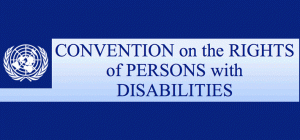 “People with even the most severe disabilities have the right to make their own decisions, no matter if their choices are risky or ultimately turn out to be mistakes, a United Nations panel says in new guidelines to nations.”
“People with even the most severe disabilities have the right to make their own decisions, no matter if their choices are risky or ultimately turn out to be mistakes, a United Nations panel says in new guidelines to nations.”
Read about it here; another bureaucratic idea that looks great on paper (especially one with such vague language it can be interpreted a zillion ways) but won’t work in reality.
Here are a few reasons why:
1. I believe everyone should have freedom of choice and some developmentally disabled folks are quite capable of making good choices on their own. Guardianship is still an important safeguard for those who can not. Such a loose policy that attempts to place everyone in the same category is foolish if not dangerous.
If Jon was allowed to make all his own choices he would never take his meds, shower or change his clothes, get a haircut, go to the doctor or dentist. He would most likely wander off down the street never to be seen again.
2. Someone has to pay for those choices. Who? The UN? Government budgets, both federal and state are tight. Wait lists are long. “Nationally, almost 317,000 people remain on waiting lists for home and community-based services…based on data from 2012, the most recent year available.”
Even those who receive disability funding usually can’t afford costly housing and other expenses for their disabled family member. Money and services are limited depending on geography and families are often one income earners or struggling single parents because someone has to be at home for the caregiving.
3. Are all parents and caregivers devoted and loving? A small percentage may not be, but these loosely worded conventions can be a slippery slope that eventually steamroll families and caregivers who most love and best know those they care for.
Someone in a far away office, creating regulations about our children’s lives and ultimately our own lives doesn’t sit well with most. I can’t help but wonder who the ‘supporting decision makers’ would eventually be.
4. “Article 12 of the Convention affirms that all persons with disabilities have full legal capacity.” It’s not clear if this translates to persons with limited mental function who commit a crime being tried as any other adult? Will no special consideration be afforded those with diminished understanding? I doubt anyone wants our over burdened prison system to become the new residential facility for the disabled who break the law.
The United States signed the United Nations Convention on the Rights of Persons with Disabilities, as did hundreds of other countries, but so far has been unsuccessful in ratifying it.
So many blanket statements and one-size-fits-all propositions exist in this treaty, I would hope Congress and The Senate would review it with common sense reservation and revision, demanding specific definition of terms and then consider if it needs to be ratified at all.
There’s certainly a great need for improvements in servicing our disabled population but shouldn’t it be done on state, local and national levels instead of by international regulation? For those of us who believe in the sovereignty of the United States, and all other nations, the answer should be clear.
